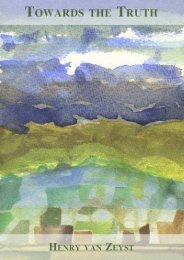Awareness in Buddhist Meditation
A detailed description of awareness in Buddhist Meditation.
A detailed description of awareness in Buddhist Meditation.
Create successful ePaper yourself
Turn your PDF publications into a flip-book with our unique Google optimized e-Paper software.
137<br />
puppets on the stage of life and may even be impressed by their skill<br />
<strong>in</strong> movement, beauty and rhythm; and see it all as part of the play<br />
of which I am no part anymore. I can use it, and use myself and<br />
others with it, as one plays with a child at make-believe, and yet<br />
not be part of it. It is not my game. I can even see myself fool<strong>in</strong>g<br />
about with the th<strong>in</strong>gs of the world, food and cloth<strong>in</strong>g, comfort and<br />
ease; and also see that those th<strong>in</strong>gs, those acts, are not m<strong>in</strong>e. I may<br />
be <strong>in</strong> the centre of the stage or not, I may not play at all; the words,<br />
the acts, the gestures, the costumes, the lights, may not affect me,<br />
for that is not myself.<br />
Yet, <strong>in</strong> see<strong>in</strong>g, there may be the concept of the spectator, who<br />
is no more part of the play, but who now has set himself up as the<br />
spectator, the critic with his superior knowledge that there is no<br />
longer a play<strong>in</strong>g puppet. To see this last l<strong>in</strong>e of ‘self’-defence is<br />
truly an awaken<strong>in</strong>g from a dream, which was a play written, produced<br />
and acted by the ‘self’. In this awaken<strong>in</strong>g of <strong>in</strong>telligence there<br />
is no further condition<strong>in</strong>g of thought and will, by memory and ideal,<br />
by volition and choice. In see<strong>in</strong>g and understand<strong>in</strong>g without condition<strong>in</strong>g<br />
there is direct action, which is not a reaction of be<strong>in</strong>g pulled<br />
by str<strong>in</strong>gs this way or that. And thus there is a perfect balance <strong>in</strong><br />
the absence of opposites.<br />
That is even-m<strong>in</strong>dedness without separation of actor and the<br />
action, of the actor on the stage and the spectator <strong>in</strong> the w<strong>in</strong>gs.<br />
That is <strong>in</strong>sight <strong>in</strong> what is. This is the truth which sets free.<br />
Then, is there is not an ‘awakener’, someone who is awakened,<br />
who is enlightened, who is emancipated, who is a Buddha? It is that<br />
very question which is one of those impossible questions (avyākata),<br />
a question which cannot be answered or decided with a yes or no. ‘Is<br />
the Buddha after his f<strong>in</strong>al deliverance existent or is he not?’ It is the<br />
question which shows the ignorance of the questioner. There is still<br />
a search for security, a search for the f<strong>in</strong>al refuge for the ‘self’. The<br />
‘I’ still wants Buddha to help, to teach, to lean on. In the dream<br />
the ‘I’ cont<strong>in</strong>ues the search, for without a search the ‘I’ is not. ‘I’

















